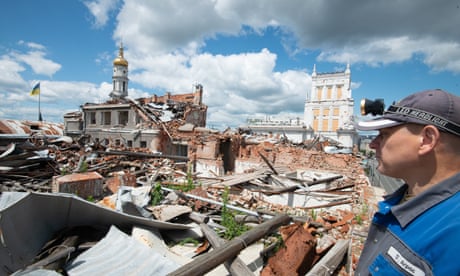The defence ministry in Kyiv issued a statement saying that from midnight on Thursday, all shipping plying Russian-held ports “may be considered by Ukraine as such carrying military cargo with all the associated risks”. The announcement mirrored a threat from Moscow on Wednesday against all ships using Ukrainian ports.
“The fate of the cruiser Moskva proves that the defence forces of Ukraine have the necessary means to repel Russian aggression at sea,” the ministry said, in a reference to the sinking of the flagship of Russia’s Black Sea Fleet last year.
“Ukrainian-made maritime drones are capable of destroying stationary and moving targets anywhere in the Black Sea,” a Ukrainian interior ministry adviser, Anton Gerashchenko, said on Twitter.
Russian raised the stakes in the Black Sea on Monday by pulling out of a UN-brokered agreement that allowed grain exports from Ukrainian ports in the interests of preventing a spike in global food prices and potential famine in some of the world’s poorest countries.
Presenting its actions as a reprisal for a Monday morning attack on the Kerch Bridge linking Russia to the occupied Crimean peninsula, Russia issued its threat against ships carrying Ukrainian cargoes and launched attacks on the port cities of Odesa, Mykolaiv and other targets in southern Ukraine.
Russia kept up the attacks for a third day on Thursday evening, killing at least two people in Odesa and injuring at least 19, including a child, in Mykolaiv, according to Ukrainian authorities. Moscow has claimed it has been aiming at military targets, but Ukraine and the US have said its attacks have destroyed agricultural infrastructure and 60,000 tons of grain, which had been stored awaiting export in Odesa.
The White House warned on Wednesday that Russia had laid additional sea mines in the approaches to Ukrainian ports.
“We believe that this is a coordinated effort to justify any attacks against civilian ships in the Black Sea and lay blame on Ukraine for these attacks,” Adam Hodge, a spokesperson for the national security council, said in a statement. Global wheat prices have risen sharply over the past few days.
The UK and US stepped up sanctions on Russian firms on Thursday. Britain’s Foreign, Commonwealth and Development Office (FCDO) announced measures against 13 individuals and businesses linked to the Russian mercenary organisation the Wagner group, for its activities in Afric, “including executions and torture in Mali and the Central African Republic and threats to peace and security in Sudan”.
Among those targeted for asset freezes, travel bans and a prohibition on dealings with British nationals or companies was Konstantin Pikalov, often described as the “right-hand man” of Wagner’s leader, Yevgeny Prigozhin, and who runs the mercenary group’s operations in Central African Republic.
“Pikalov is responsible for the Wagner group’s torture and targeted killings of civilians,” a FCDO statement said.
Another target was Ivan Maslov, the head of the Wagner group in Mali, where Russian mercenaries, alongside Malian forces, are accused of massacring at least 500 people in the town of Moura in March 2022. Summary executions were reported, as well as rape and torture. The UK also announced measures against three alleged Wagner front companies in Sudan “due to the continued risk they pose to peace and stability”.
Andrew Mitchell, the minister for development and Africa, said: “These sanctions expose despicable individuals who have commissioned violations of international humanitarian law, holding them to account for the severe harm they are inflicting on innocent civilians for financial gain.”
The US state department issued new sanctions on Thursday aimed at Russia’s energy product and export sectors, including Nipigaz, an engineering and construction company, which the US says is “directing construction activities and purchasing material for the development of future Russian energy export projects”.






